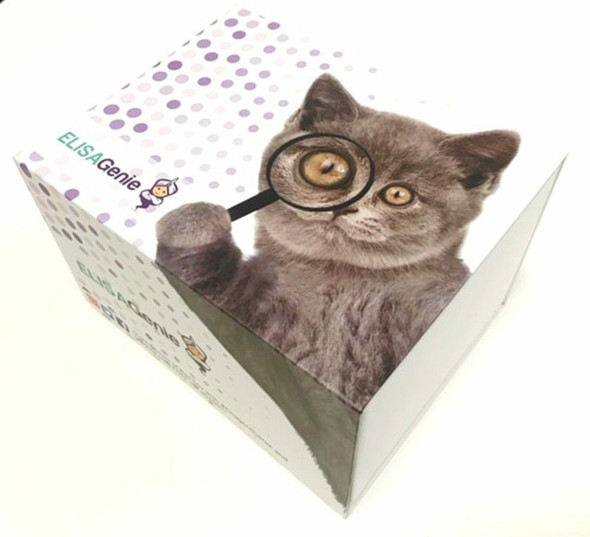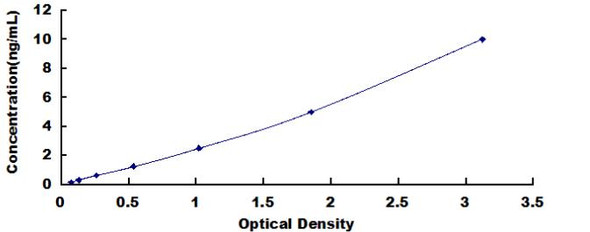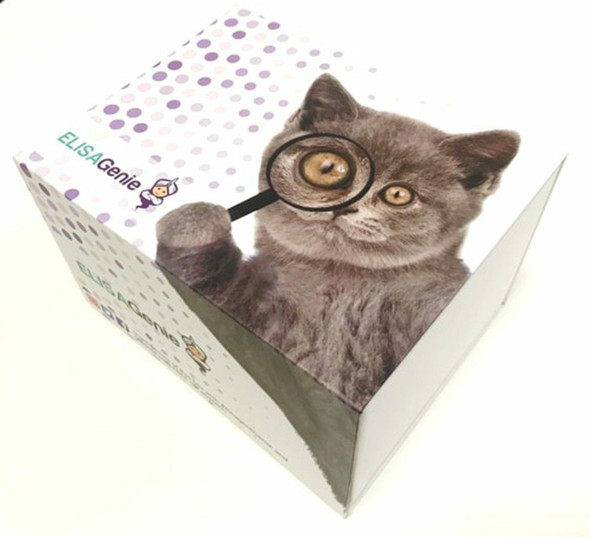Rat Neuregulin 1/NRG1 ELISA Kit (RTFI00996)
- SKU:
- RTFI00996
- Product Type:
- ELISA Kit
- Size:
- 96 Assays
- Uniprot:
- P43322
- Sensitivity:
- 0.094ng/ml
- Range:
- 0.156-10ng/ml
- ELISA Type:
- Sandwich
- Synonyms:
- NRG-1, Heregulin-1, HGL, HRG1-alpha, HRG1-beta 1, NRG1, ARIA, GGF2, GGF, glial growth factor, HGLneu differentiation factor, HRG, HRG1, HRGA, neuregulin 1 type IV beta 1a, MST131, MSTP131, NDFheregulin, alpha, 45kD, ERBB2 p185-activator, neuregulin 1
- Reactivity:
- Rat
Description
Rat Neuregulin 1/NRG1 ELISA Kit
The Rat Neuregulin-1 (NRG1) ELISA Kit is specially designed for the precise measurement of NRG1 levels in rat serum, plasma, and tissue homogenates. This kit offers exceptional sensitivity and specificity, ensuring accurate and consistent results for various research purposes.NRG1 is a key protein involved in neuronal development and function, playing a critical role in promoting cell survival, migration, and differentiation.
Dysregulation of NRG1 has been linked to various neurological disorders, making it a valuable biomarker for studying these conditions and exploring potential treatment options.With its reliable performance and easy-to-follow protocol, the Rat Neuregulin-1 (NRG1) ELISA Kit is an indispensable tool for researchers investigating the role of NRG1 in neurobiology and its implications in disease pathology.
| Product Name: | Rat Neuregulin 1/NRG1 ELISA Kit |
| Product Code: | RTFI00996 |
| Size: | 96 Assays |
| Target: | Rat NRG-1 |
| Alias: | NRG-1, Heregulin-1, HGL, HRG1-alpha, HRG1-beta 1, NRG1, ARIA, GGF2, GGF, glial growth factor, HGLneu differentiation factor, HRG, HRG1, HRGA, neuregulin 1 type IV beta 1a, MST131, MSTP131, NDFheregulin, alpha, 45kD, ERBB2 p185-activator, neuregulin 1, neuregulin 1 type IV beta 3, pro-neuregulin-1, membrane-bound isoform, pro-NRG1, sensory and motor neuron derived factor, SMDF |
| Reactivity: | Rat |
| Detection Method: | Sandwich ELISA, Double Antibody |
| Sensitivity: | 0.094ng/ml |
| Range: | 0.156-10ng/ml |
| Storage: | 4°C for 6 months |
| Note: | For Research Use Only |
| Recovery: | Matrices listed below were spiked with certain level of Rat NRG-1 and the recovery rates were calculated by comparing the measured value to the expected amount of Rat NRG-1 in samples. | ||||||||||||||||
| |||||||||||||||||
| Linearity: | The linearity of the kit was assayed by testing samples spiked with appropriate concentration of Rat NRG-1 and their serial dilutions. The results were demonstrated by the percentage of calculated concentration to the expected. | ||||||||||||||||
| |||||||||||||||||
| Intra-Assay: | CV <8% | ||||||||||||||||
| Inter-Assay: | CV <10% |
| Uniprot: | Q9JKM5 |
| UniProt Protein Function: | EDG8: Receptor for the lysosphingolipid sphingosine 1- phosphate (S1P). S1P is a bioactive lysophospholipid that elicits diverse physiological effect on most types of cells and tissues. Is coupled to both the G(i/0)alpha and G(12) subclass of heteromeric G-proteins. May play a regulatory role in the transformation of radial glial cells into astrocytes and may affect proliferative activity of these cells. Belongs to the G-protein coupled receptor 1 family. 2 isoforms of the human protein are produced by alternative splicing. |
| UniProt Protein Details: | Protein type:Membrane protein, integral; Membrane protein, multi-pass; GPCR, family 1; Receptor, GPCR Cellular Component: integral to membrane; plasma membrane Molecular Function:G-protein coupled receptor activity Biological Process: regulation of neuron differentiation |
| NCBI Summary: | G protein-coupled receptor for the lysolipid phosphoric acid mediator sphingosine 1-phosphate [RGD, Feb 2006] |
| UniProt Code: | Q9JKM5 |
| NCBI GenInfo Identifier: | 62510532 |
| NCBI Gene ID: | 60399 |
| NCBI Accession: | Q9JKM5.1 |
| UniProt Secondary Accession: | Q9JKM5,Q9QY79, |
| UniProt Related Accession: | Q9JKM5 |
| Molecular Weight: | 42,369 Da |
| NCBI Full Name: | Sphingosine 1-phosphate receptor 5 |
| NCBI Synonym Full Names: | sphingosine-1-phosphate receptor 5 |
| NCBI Official Symbol: | S1pr5 |
| NCBI Official Synonym Symbols: | Edg8; Edg-8 |
| NCBI Protein Information: | sphingosine 1-phosphate receptor 5 |
| UniProt Protein Name: | Sphingosine 1-phosphate receptor 5 |
| UniProt Synonym Protein Names: | Endothelial differentiation G-protein-coupled receptor 8; Nerve growth factor-regulated G-protein-coupled receptor 1; NRG-1; Sphingosine 1-phosphate receptor Edg-8; S1P receptor Edg-8 |
| UniProt Gene Name: | S1pr5 |
| UniProt Entry Name: | S1PR5_RAT |
| Step | Procedure |
| 1. | Set standard, test sample and control (zero) wells on the pre-coated plate respectively, and then, record their positions. It is recommended to measure each standard and sample in duplicate. Wash plate 2 times before adding standard, sample and control (zero) wells! |
| 2. | Aliquot 0.1ml standard solutions into the standard wells. |
| 3. | Add 0.1 ml of Sample / Standard dilution buffer into the control (zero) well. |
| 4. | Add 0.1 ml of properly diluted sample ( Human serum, plasma, tissue homogenates and other biological fluids.) into test sample wells. |
| 5. | Seal the plate with a cover and incubate at 37°C for 90 min. |
| 6. | Remove the cover and discard the plate content, clap the plate on the absorbent filter papers or other absorbent material. Do NOT let the wells completely dry at any time. Wash plate X2. |
| 7. | Add 0.1 ml of Biotin- detection antibody working solution into the above wells (standard, test sample & zero wells). Add the solution at the bottom of each well without touching the side wall. |
| 8. | Seal the plate with a cover and incubate at 37°C for 60 min. |
| 9. | Remove the cover, and wash plate 3 times with Wash buffer. Let wash buffer rest in wells for 1 min between each wash. |
| 10. | Add 0.1 ml of SABC working solution into each well, cover the plate and incubate at 37°C for 30 min. |
| 11. | Remove the cover and wash plate 5 times with Wash buffer, and each time let the wash buffer stay in the wells for 1-2 min. |
| 12. | Add 90 µL of TMB substrate into each well, cover the plate and incubate at 37°C in dark within 10-20 min. (Note: This incubation time is for reference use only, the optimal time should be determined by end user.) And the shades of blue can be seen in the first 3-4 wells (with most concentrated standard solutions), the other wells show no obvious color. |
| 13. | Add 50 µL of Stop solution into each well and mix thoroughly. The color changes into yellow immediately. |
| 14. | Read the O.D. absorbance at 450 nm in a microplate reader immediately after adding the stop solution. |
When carrying out an ELISA assay it is important to prepare your samples in order to achieve the best possible results. Below we have a list of procedures for the preparation of samples for different sample types.
| Sample Type | Protocol |
| Serum: | If using serum separator tubes, allow samples to clot for 30 minutes at room temperature. Centrifuge for 10 minutes at 1,000x g. Collect the serum fraction and assay promptly or aliquot and store the samples at -80°C. Avoid multiple freeze-thaw cycles. If serum separator tubes are not being used, allow samples to clotovernight at 2-8°C. Centrifuge for 10 minutes at 1,000x g. Removeserum and assay promptly or aliquot and store the samples at-80°C. Avoid multiple freeze-thaw cycles. |
| Plasma: | Collect plasma using EDTA or heparin as an anti-coagulant. Centrifuge samples at 4°C for 15 mins at 1000 × g within 30 mins of collection. Collect the plasma fraction and assay promptly or aliquot and store the samples at -80°C. Avoid multiple freeze-thaw cycles.Note: Over haemolysed samples are not suitable for use with this kit. |
| Urine & Cerebrospinal Fluid: | Collect the urine (mid-stream) in a sterile container, centrifuge for 20 mins at 2000-3000 rpm. Remove supernatant and assay immediately. If any precipitation is detected, repeat the centrifugation step. A similar protocol can be used for cerebrospinal fluid. |
| Cell Culture Supernatant: | Collect the cell culture media by pipette, followed by centrifugation at 4°C for 20 mins at 1500 rpm. Collect the clear supernatant and assay immediately. |
| Cell Lysates: | Solubilize cells in lysis buffer and allow to sit on ice for 30 minutes. Centrifuge tubes at 14,000 x g for 5 minutes to remove insoluble material. Aliquot the supernatant into a new tube and discard the remaining whole cell extract. Quantify total protein concentration using a total protein assay. Assay immediately or aliquot and store at ≤ -20°C. |
| Tissue Homogenates: | The preparation of tissue homogenates will vary depending upon tissue type. Rinse tissue with 1X PBS to remove excess blood & homogenizein 20ml of 1X PBS (including protease inhibitors) and store overnight at ≤ -20°C. Two freeze-thaw cycles are required to break the cell membranes. To further disrupt the cell membranes you can sonicate the samples. Centrifuge homogenates for 5 mins at 5000xg. Remove the supernatant and assay immediately or aliquot and store at -20°C or-80°C. |
| Tissue Lysates: | Rinse tissue with PBS, cut into 1-2 mm pieces, and homogenize with a tissue homogenizer in PBS. Add an equal volume of RIPA buffer containing protease inhibitors and lyse tissues at room temperature for 30 minutes with gentle agitation. Centrifuge to remove debris. Quantify total protein concentration using a total protein assay. Assay immediately or aliquot and store at ≤ -20 °C. |
| Breast Milk: | Collect milk samples and centrifuge at 10,000 x g for 60 min at 4°C. Aliquot the supernatant and assay. For long term use, store samples at -80°C. Minimize freeze/thaw cycles. |






